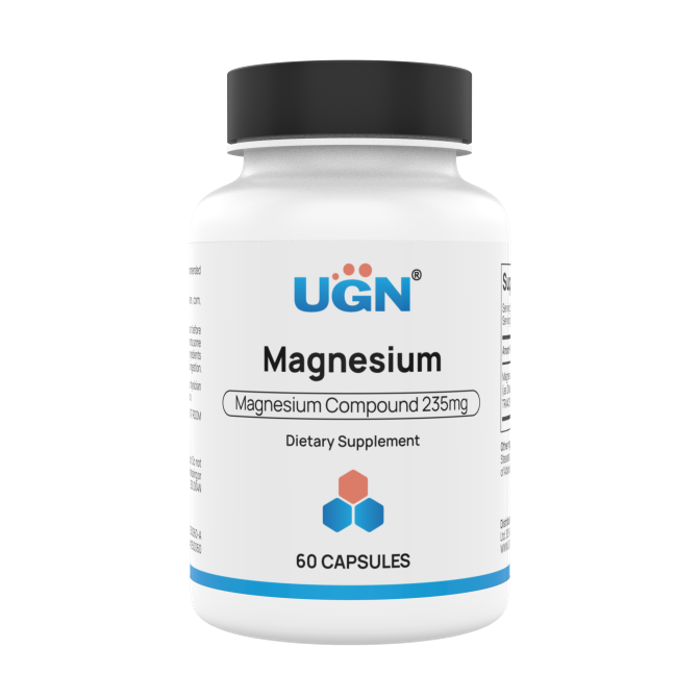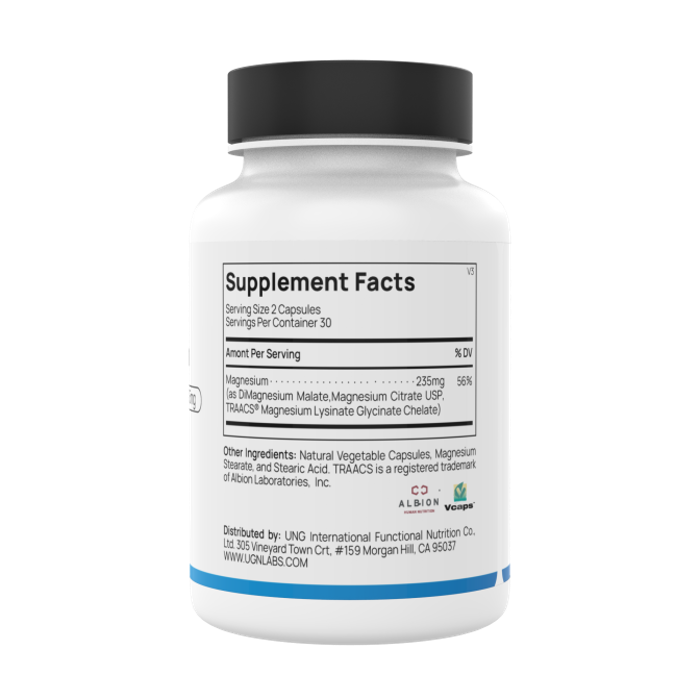



Magnesium is an abundant mineral in the body and is found naturally in many foods, like green leafy vegetables. It is also found in over-the-counter medications, such as laxatives. The average American intake of magnesium, according to the National Health and Nutrition Examination Survey (NHANES Study) is critically low: Many Americans fail to consume the estimated average requirement (EAR) established by the Institute of Medicine. In addition, more than 57% of the population does not meet the United States Department of Agriculture requirements for magnesium in the diet. Intracellular magnesium levels are decreased by excessive intake of alcohol, salt, coffee, phosphoric acid found in sodas, diets high in calcium and high stress levels. Because of widespread nature of magnesium deficiencies, adequate daily intake of magnesium is critical for proper hydration, stress response, muscle relaxation, promoting healthy blood pressure levels, optimal bone mineral density, and blood sugar regulation.
Reacted Magnesium provides three unique forms of highly-absorbed magnesium to ensure maximum absorption of this important macromineral. Most magnesium supplements use only a single source of magnesium, which can easily overwhelm a single pathway of absorption and limit uptake. Reacted Magnesium takes advantage of three unique pathways of absorption by providing magnesium as di-magnesium malate, magnesium citrate and magnesium glycinate for enhanced absorption, improved utilization and gastrointestinal (GI) comfort. Some individuals, who take other forms of magnesium supplements, often experience GI side effects, including gas, bloating, diarrhea, constipation or a combination of these symptoms. The forms of magnesium used in Reacted Magnesium preserve GI comfort while maximizing absorption and restoring magnesium levels in the body.
Bioavailability- The Mineral Chelate Difference
The importance of bioavailability is obvious. If consuming a magnesium supplement has little effect on improving the body’s magnesium balance, there is no reason to ingest it. Signs of inferior mineral supplements include the use of cheap, poorly absorbed, rock-salt minerals like calcium carbonate and magnesium oxide. These mineral forms slow and limit absorption, relying on adequate stomach acid to release magnesium ions which then enter the body via passive diffusion. And, because they tend to remain in the intestines longer, these forms of mineral supplements can cause intestinal distress such as constipation (calcium carbonate) or diarrhea (magnesium oxide). Reacted Magnesium provides the additional benefit of highly-absorbed, Albion® mineral chelates. Albion® is the world leader in manufacturing highly bioavailable mineral chelates, a specialized form of minerals bound to amino acids. This patented process creates organic mineral compounds which use active absorption mechanisms in the gastrointestinal tract to greatly enhance mineral absorption. In a magnesium comparison study reported by Graff et al. at Weber State University, Albion®’s magnesium amino acid chelate had:
- 8.8 times greater absorption than magnesium oxide
- 5.6 times greater absorption than magnesium sulfate
- 2.3 times greater absorption than magnesium carbonate
In addition, other comparison studies have shown significantly superior absorption of magnesium chelates compared to other mineral forms:
- At a dose of 400 mg, magnesium chelate significantly reduced or eliminated menstrual abdominal discomfort.
- Multiple double blind studies found urinary excretion of magnesium chloride higher than magnesium glycinate, proving superior absorption.
- Magnesium glycinate is shown to have a reduced laxative effect when compared to other forms of magnesium.
Mineral chelates are gentle, gut “friendly” minerals that do not cause diarrhea that often accompanies magnesium oxide and other rock-salt forms. Albion®’s mineral chelates have extensive clinical research proving their superior bioavailability, biologic activity, stability, and improved tolerance.
1. Moshfegh A, Goldman J, Ahuja J, Rhodes D, LaComb R. 2009. What We Eat in America, NHANES 2005-2006: Usual Nutrient Intakes from Food and Water Compared to 1997 Dietary Reference Intakes for Vitamin D, Calcium, Phosphorus, and Magnesium. U.S. Department of Agriculture, Agricultural Research Service.
2. Johnson S. The multifaceted and widespread pathology of magnesium deficiency. Med Hypotheses 2001; 56(2): 163-70.
3. Ryder KM, Shorr RI, Bush AJ, Kritchevsky SB, Harris T,Stone K, Cauley J, Tylavsky FA. Magnesium intake from food and supplements is associated with bone mineral density in healthy older white subjects. J AM Geriatr Soc 2005; 53(11):1875-80.
4. Gobbo LCD, Imamura F, Wu JH, Otto MCO, Chiuve SE, Mozaffarian D. Circulating and dietary magnesium and risk of cardiovascular disease: a systematic review and meta-analysis of prospective studies. Am J Clin Nutr 2013; published online May 29,2013.
5. Schuette SA, Lashner BA, Janghorbani IY. Bioavailability of Magnesium diglycinate vs. magnesium oxide in patients with ileal resection. J Parent Ent Nutr, 18:430-435, 1994.
6. Institute of Medicine (IOM). Food and Nutrition Board.Dietary Reference Intakes: Calcium, Phosphorus, Magnesium, Vitamin D and Fluoride. Washington, DC: National Academy Press, 1997.
7. Rude RK. Magnesium. In: Coates PM, Betz JM,Blackman MR, Cragg GM, Levine M, Moss J, White JD, eds.
Encyclopedia of Dietary Supplements. 2nd ed. New York, NY: Informa Healthcare; 2010:527-37.
8. Rude RK. Magnesium. In: Ross AC, Caballero B, Cousins RJ, Tucker KL, Ziegler TR, eds. Modern Nutrition in Health and Disease. 11th ed. Baltimore, MD: Lippincott Williams & Wilkins; 2012:159-75.
9. Dickinson HO, Nicolson D, Campbell F, Cook JV, Beyer FR, Ford GA, Mason J. Magnesium supplementation for the management of primary hypertension in adults. Cochrane Database of Systematic Reviews 2006: CD004640.
10. Del Gobbo LC, Imamura F, Wu JHY, Otto MCdO, Chiuve SE, Mozaffarian D. Circulating and dietary magnesium and risk of cardiovascular disease: a systematic review and meta-analysis of prospective studies. Am J Clin Nutr 2013;98:160-73.
11. Larsson SC, Wolk A. Magnesium intake and risk of type 2 diabetes: a meta-analysis. J Intern Med 2007;262:208-14.
16. Rodriguez-Moran M, Simental Mendia LE, Zambrano Galvan G, Guerrero-Romero F. The role of magnesium in type 2 diabetes: a brief based-clinical review. Magnes Res 2011;24:156-62.
12. Schulze MB, Schulz M, Heidemann C, Schienkiewitz A, Hoffmann K, Boeing H. Fiber and magnesium intake and incidence of type 2 diabetes: a prospective study and meta-analysis. Arch Intern Med 2007;167:956–65.
13. Rude RK, Singer FR, Gruber HE. Skeletal and hormonal effects of magnesium deficiency. J Am Coll Nutr
2009;28:131–41.